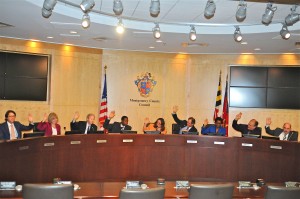 Council President Nancy Navarro provided the keynote commencement address for graduating seniors at Wheaton High School. The commencement ceremony took place at DAR Constitution Hall in Washington, DC. In the address, Council President Navarro recounted her inspirational journey from a child growing up in Venezuela to President of the Montgomery County Board of Education to President of the Montgomery County Council. You can read her prepared remarks below.
Council President Nancy Navarro provided the keynote commencement address for graduating seniors at Wheaton High School. The commencement ceremony took place at DAR Constitution Hall in Washington, DC. In the address, Council President Navarro recounted her inspirational journey from a child growing up in Venezuela to President of the Montgomery County Board of Education to President of the Montgomery County Council. You can read her prepared remarks below.
2013 Wheaton High School Commencement Address by Council President Nancy Navarro
As prepared for delivery on June 5, 2013 at DAR Constitution Hall
Good morning Graduates! Parents, families, friends-
What a glorious day it is. It is a great honor to be with you today.
I want to acknowledge the members of the Board of Education, Superintendent Joshua Starr, Wheaton HS Principal Kevin Lowndes, faculty, administrative staff, and support service personnel. Thank you for all that you do for our students and families- you have the most important job in our society, that of educating our future!
Para la comunidad Latina presente: quiero decirles que es un honor para mi poder compartir este dia tan especial en sus vidas. Los felicito por este gran logro y les deseo mucho exito en esta nueva etapa. Adelante siempre.
Today we celebrate the acquisition of a dream. A dream rooted in the vision, tenacity and faith of parents, grandparents, uncles, cousins, neighbors from faraway places. Places nestled in Central America, South America, the Caribbean, West, East, North or South Africa, South-East Asia or Europe.
Somehow we all converge here in this Hall, in this region, in this country, to witness your “bridge moment”- the moment when you begin your own journey towards your personal dream. That dream that we as parents envisioned for you the moment we laid eyes on your beautiful, perfect faces.
You are the protagonists of a new era — The face of the United States is changing, and it looks like you!
This is why it’s imperative that you own your potential and your power, so you can make a positive difference. A positive difference for this country of ours and for the world. Each of us has a story and today you are taking an important step in the development of your own narrative.
Once upon a time–in 1974 to be exact–in a place called Judibana, Estado Falcon, Venezuela, a father casually asked his 9 year old daughter if she wanted to come to the United States with the family for two years. He would be a student at the Department of Petroleum Engineering at the University of Missouri, Rolla, and that little girl would have the chance to fulfill a dream: learning to speak English.
That little girl was me, and I wanted nothing more than to learn to speak English. That desire came from my time spent in the town square, La Plaza, listening to many children and their parents, who worked for the oil industry, speaking this intriguing language. I would play dolls and pretend I spoke English too— “wishy, washy, hello, bye-bye, ice cream, stop” that was the extent of my English proficiency.
So, I was elated to make the move, even if it meant moving from a spacious home to a 2 bedroom student apartment, from a peninsula surrounded by the Caribbean Ocean with 365 days of glorious sun, to a place where people would often say, “if you don’t like the weather wait 5 minutes and it will change,” blizzards, tornadoes, scorching heat all at once. It meant leaving my aunts, uncles, cousins, and my beloved “Abuelita” to be in a place full of complete strangers who spoke the wishy, woshy Language.
I just took it all in, I learned English in 6 months, became a champion at tether Ball and kick-ball during recess, painted a mural for the U.S. Bicentennial celebration of 1976, and learned not to get dizzy at the local supermarket isle of hundreds of breakfast cereal choices. Then when 1977 rolled around, I made an announcement to my parents:
“I want to stay in the United States so I can go to College when I grow up, my friend Michele says I can stay with her family”
My parents tried very hard not to burst out laughing, and instead told me some story about how it was against the law for a 12 year old kid to stay in another country by herself- but that when I graduated from High School in Venezuela, if I still wanted to, I could come back.
So, in 1983, I did just that. I arrived at the University of Missouri-Columbia, 17 years old- I knew one person, my friend Michele. I had a great College experience. I graduated in 1987, worked for 2 years and as I was preparing to move back to Venezuela, I came to DC for a short stay.
During that stay, I met my husband- we have been married for 22 years, and we have two amazing daughters ages 20 and 16. We started from the bottom, (now we’re here). He built his small business from the ground up and now employs more that 125 people- and last December I became the First Latina, (and Immigrant) President of the Montgomery County Council. Thus making history.
I wanted to share a snapshot of my journey, because often times we may have a sense of what we want to be, where we are going, or which turn to make- but somehow life may have other plans for you- so you must always be prepared for what comes your way.
This is especially true today. We live in a time of rapid transition and you are defining this shift. Think about it, your class started Kindergarten in the year 2000- a pivotal marker for humanity- but in that year:
- Not a single state recognized gay marriage; today 12 states and DC have legalized gay marriage
- 30% of the 360 million global internet users were in North America. Today, only 11% of 2.4 billion global internet users are in North America
- In 2000, there were 8 cell phones per 100 people worldwide. By 2010, it was 76 per 100 people.
- US Population grew 9.7% from 2000 to 2010. Maryland grew by 9%, although the DC Metro Area grew by 16.4%.
- In 2000, Barack Obama ran unsuccessfully for the US House of Representatives- He is now on his second term as the First ever African American President
- Between 2000 and 2010- The Latino population in the US grew by 44%- There are 50 million Latinos
- 2008 marked the beginning of an unprecedented global recession
And looking ahead, we are at the cusp of some amazing changes, such as:
- Expansion of mobile internet across the globe;
- Rise of robots and automation of everything like: Driverless cars, Drones, Manufacturing, even skilled knowledge jobs like searching documents for law suits or customer service.
- 3D printing – If you can design it (or find a design on the internet) and its made of plastic, you can print it out
- Gene sequencing and personalized medicine
- Wearable Computers (Google Glass)
- Online Education – especially hybrid classroom/online models, can revolutionize the acquisition of education world-wide
- Big Data–We can increasingly use data to find the answer to anything
- The human genome was first sequenced in Montgomery County, and as the procedure gets cheaper and cheaper we will be able to use genetics to customize our medicine, our diets, and more.
The amazing thing is that you are poised to succeed in this changing environment because you are graduating from one  of the best school systems in the country. Montgomery County Public Schools is a system that reflects the nation’s demographics, and thus the global stage. You have been exposed to different cultures, languages, socio-economic diversity, as well as, educational rigor and high expectations.
of the best school systems in the country. Montgomery County Public Schools is a system that reflects the nation’s demographics, and thus the global stage. You have been exposed to different cultures, languages, socio-economic diversity, as well as, educational rigor and high expectations.
These are skills that will set you apart, and will provide you with an edge to compete in this global economy. So make sure to continue developing these skills, because they are great assets, don’t let anyone tell you otherwise.
In closing I want to share 6 lessons that I have learned along the way:
1. Each of you is a collection of greatness. You have all that is necessary to achieve and succeed. Be impeccable with your thoughts and your words. Stay away from negativity, surround yourself with positive people, and positive habits.
2. Be specific in the drafting of your dreams. Put it out to universe. You will be surprised at how quickly the Universe responds.
3. Be patient and strategic. Plans are the opposite of instant gratification. You must build stepping stones, you must think through your decisions. Every decision is a step towards or away from your destination.
4. There are no short cuts. Everything worth having takes effort. You will doubt yourself, you will be scared! In those moments remember that you have what it takes to overcome, to perform, to achieve. Ask your soul to help you and you will be amazed. No matter what- work your plan! Bring it to life!
5. Always pray for wisdom and humility. Learn from those who have been there and done that. Like your elders. Once you have achieved greatness be humble- there is no one better or less than you.
6. Give back. Share your greatness- over and over
Congratulations Graduates.
May God Bless Each and every one of you! Que Dios los bendiga!


